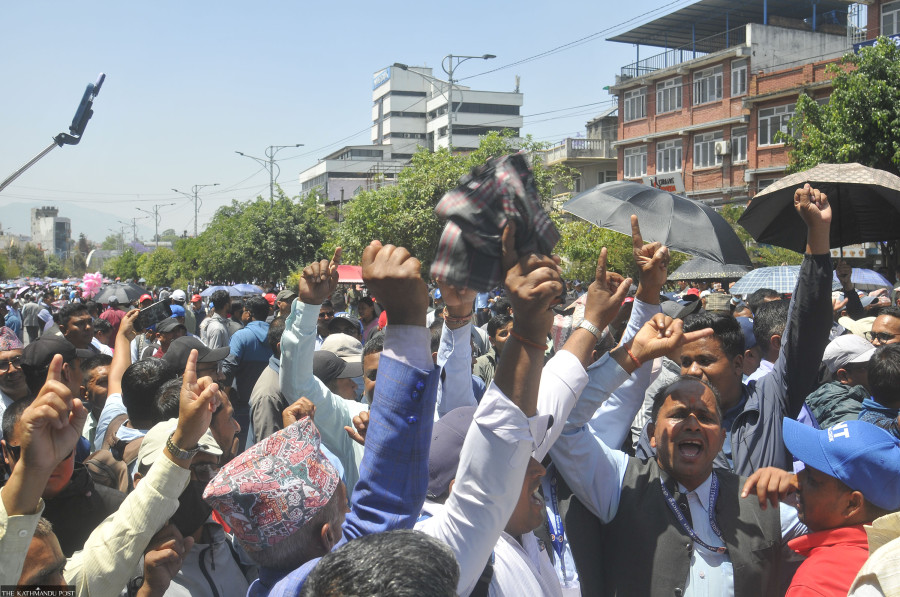National
Protesting teachers sit for talks but refuse to budge
The ministry has until Tuesday to report to the court on progress in ensuring children’s right to education.
Post Report
Talks between the government and school teachers, held nearly a month after the agitation began, ended inconclusively on Saturday after the protesters stuck to the promulgation of the School Education Act as their bottom line.
Newly appointed Education Minister Raghuji Pant discussed with the representatives of Nepal Teachers’ Federation, following Thursday’s Supreme Court ruling to ensure that teaching-learning activities commence within three days.
“We informed him about our demands. Teachers will not return [to schools] without the Act,” said Laxmi Kishor Subedi, the federation’s chair. “There was no agreement today [Saturday], but we have agreed to sit at the table again.” The next meeting has not been scheduled.
During the meeting, the teachers presented their demands, which includes assurance of pay and perks at par with those of civil servants. The list also includes payment of grades, allowances to relief quota teachers, a hospital dedicated to teachers’ treatment or health checkups at a discounted price at the Civil Service Hospital. Permanent status for temporary teachers through internal competitions is another demand.
Allowing them to work under the federal government is a demand, too, though they downplay it following criticism that it is against the spirit of the constitution.
According to a teacher’s representative present at the meeting, Pant said that the government was ready to address all the demands, to the extent it is affordable. The minister had urged them to withdraw their protest, saying that the School Education Bill would be endorsed at the earliest. But Pant could not give them a deadline as it is still under consideration in a sub-panel of the Education, Health and Information Technology Committee of the House of Representatives.
“We said the withdrawal of the protest was not possible without a guarantee of the Act,” said the teacher. Teachers want the bill to be tabled in Parliament—at the least.
The panel has until May 4 to finalise the bill and submit to the education committee. As many as 161 lawmakers from the ruling and opposition parties have registered 1,758 amendments to the bill. Despite lengthy discussions, there have yet to come to agreements on half of them.
The panel finds it hard to agree on provisions related to teacher management and the regulation of private schools.
The education ministry is under pressure as the Supreme Court on Thursday ordered it to ensure the children’s right to education is not hampered.
Issuing an interim order in a writ petition, the top court said that the protest has, prima facie, denied the students their right to education, and it should be withdrawn within three days.
The single bench of Justice Nahakul Subedi also asked the relevant authorities to ensure the Secondary Education Examination results are published on time and there is no postponement of the grade 12 examinations.
It also directed the ministry to report to the court within four days whether its order has been implemented. As the ministry received the order on Friday, it has until Tuesday to report.
The federation had been denying the government’s repeated calls for dialogue but the court order prompted them to sit for talks.




 25.12°C Kathmandu
25.12°C Kathmandu












